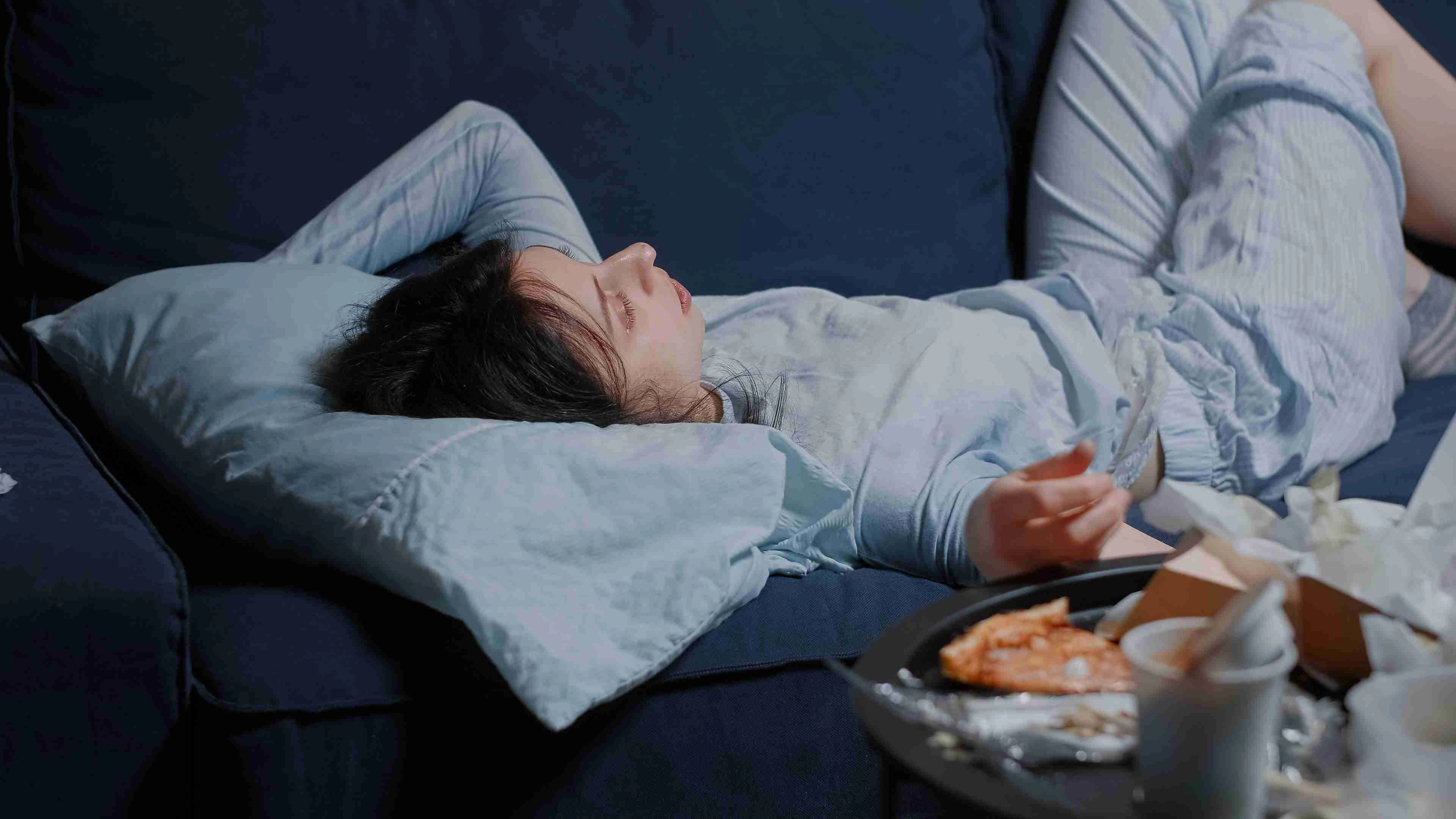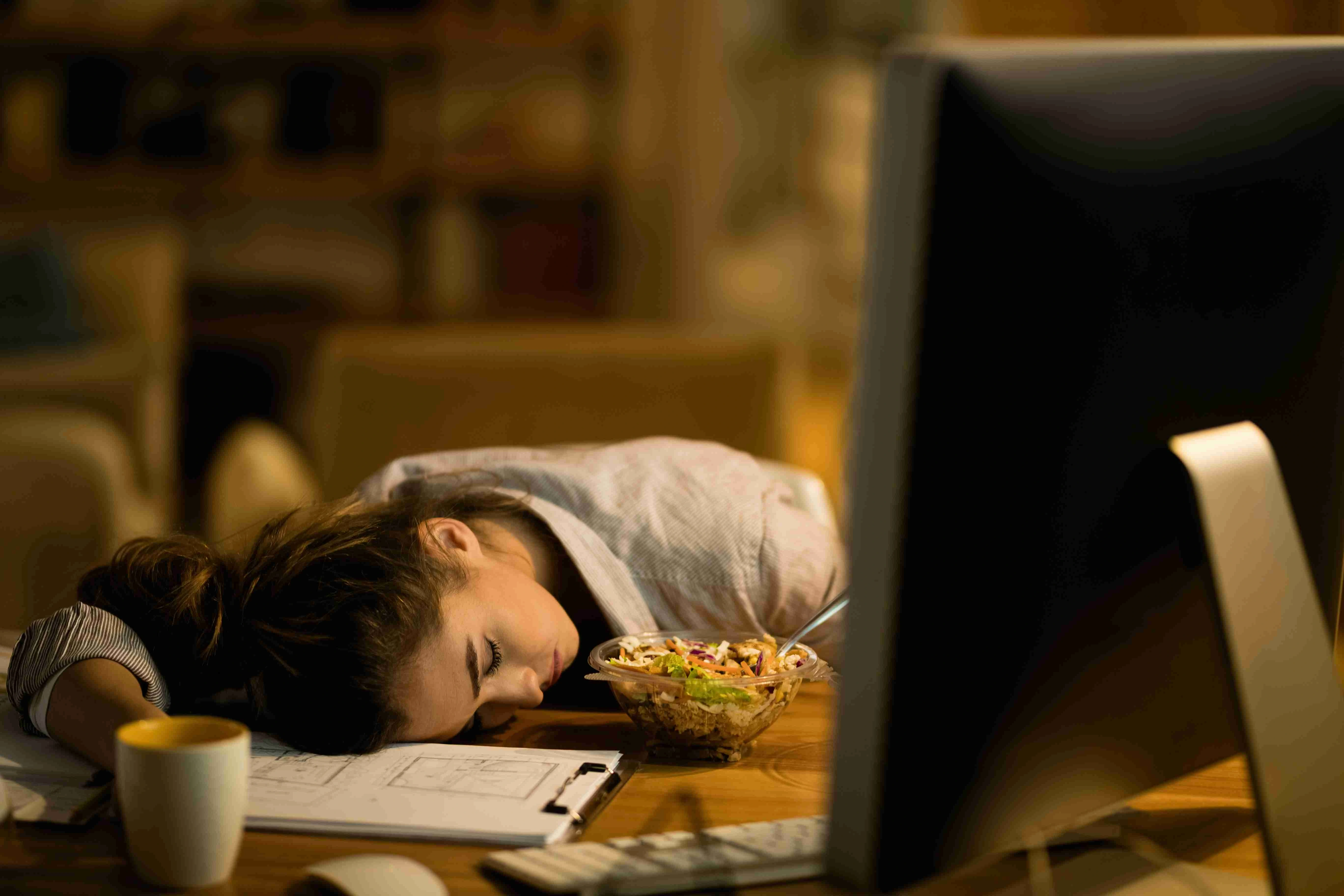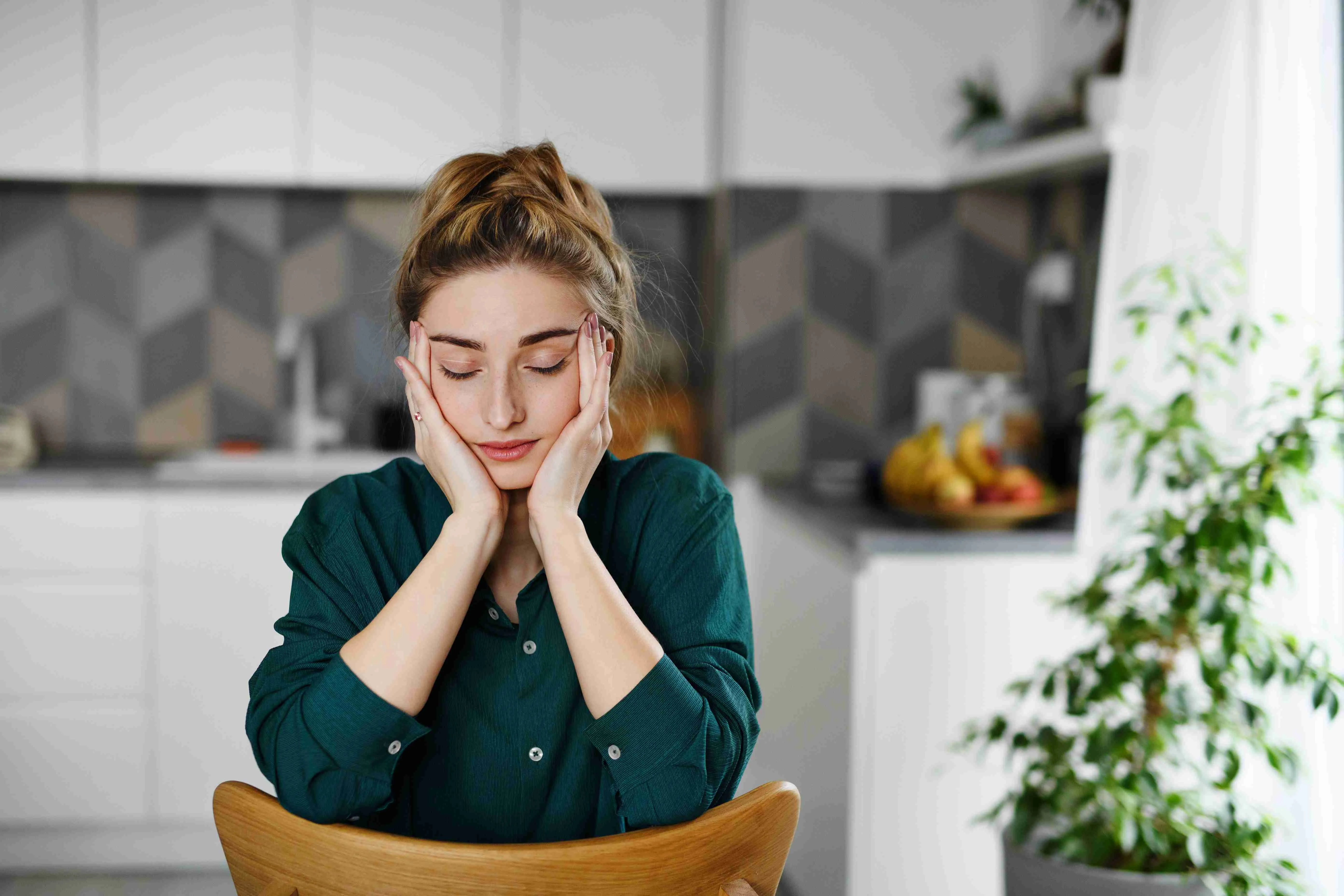If you have ever dozed off in class after lunch or fell right asleep after a hearty holiday meal, you have experienced something medical experts call “postprandial somnolence” or post-meal sleepiness.
This phenomenon is far more complex than simply eating too much. It's a result of our nutrition and biological processes involving our digestive system, amino acids, and brain chemistry.
From digestion to the influence of insulin on blood sugar levels and the role of hormones, our bodies undergo significant changes after we eat. In this article, we go through the reasons behind post-meal sleepiness and how to deal with it.
Key Takeaways
- Feeling sleepy after eating is your body’s natural physiological response influenced by digestion, blood sugar fluctuations, and tryptophan's role in serotonin production. It varies based on meal composition, size, timing, and individual factors.
- High-carbohydrate meals can heighten sleepiness, protein intake has mixed effects, and fatty foods can impact sleep patterns depending on overall dietary balance and timing.
- Exercise, sleep quality, stress, mental fatigue, hormonal changes, circadian rhythms, and portion sizes significantly influence how sleepy you feel after a meal.
- You can manage drowsiness by moderating your portions, balancing macronutrients, timing meals strategically, maintaining regular exercise, improving sleep quality, and managing stress.
What is Post-Meal Sleepiness?
Post-meal sleepiness, also known as postprandial somnolence or colloquially as a "food coma," is a common physiological response characterized by a sudden onset of drowsiness and reduced alertness shortly after consuming a meal, particularly a large or heavy one.
Increased blood flow to the digestive system, hormonal changes brought on by eating, the presence of specific amino acids like tryptophan in food, and the body's reaction to high-carbohydrate meals are a few factors that cause this phenomenon.
Factors such as meal composition, size, and timing, along with an individual's overall health and sleep patterns, influence the intensity of post-meal sleepiness, which can vary among individuals. While occasional post-meal drowsiness is normal, persistent or severe symptoms may warrant medical attention.
Understanding this natural tendency can help individuals better manage their eating habits and daily schedules to maintain optimal alertness and productivity throughout the day.
Why do I get so sleepy after I eat anything?

There are a number of biological reasons why you get sleepy after eating, ranging from the digestive process, blood sugar levels and amino acids. Let’s explore them below.
The Digestive Process and Energy Expenditure
The digestion process itself plays a significant role in the onset of post-meal drowsiness. When you consume food, your body initiates a complex series of chemical and mechanical processes to break down the nutrients and absorb them into the bloodstream. This process requires a substantial amount of energy, which can lead to a temporary dip in your overall energy levels.
During digestion, the parasympathetic nervous system, responsible for regulating the body's "rest and digest" functions, becomes more active. This shift in nervous system activity can contribute to feelings of relaxation and drowsiness as the body focuses its resources on the digestive process.
Insulin and Blood Sugar Levels
Insulin release and blood sugar fluctuations are key factors in post-meal sleepiness. After eating, particularly meals high in carbohydrates, your body releases insulin to help cells absorb glucose from the bloodstream.
The rapid rise in blood sugar that follows this insulin release can result in fatigue and drowsiness. If your body releases too much insulin, it can result in a blood sugar crash, leading to extreme tiredness and difficulty concentrating.
Tryptophan and Serotonin Production
Tryptophan, an essential amino acid found in many foods, plays a crucial role in post-meal sleepiness. Tryptophan is a precursor to serotonin, a neurotransmitter associated with mood regulation and sleep. There's an increase in tryptophan availability after eating, particularly foods rich in tryptophan such as eggs, fish, spinach, tofu, meat, and cheese.
This increased tryptophan can lead to higher serotonin production in the brain, which can induce feelings of relaxation and drowsiness. Additionally, the conversion of serotonin into melatonin, a hormone that regulates sleep-wake cycles, further contributes to post-meal sleepiness.
What Foods Make You Sleepy?
The composition of your meal can have a significant impact on how much post-meal drowsiness you experience. Different macronutrients (carbohydrates, proteins, and fats) have different effects on your energy levels and sleep-wake cycles.
High-Carbohydrate Meals
High-carbohydrate meals have a significant impact on sleepiness and sleep quality. Consuming high-glycemic index (GI) carbohydrates can affect sleep onset latency (SOL) and overall sleep. This suggests that the timing of high-carbohydrate meals is crucial in influencing sleepiness and sleep quality.
Additionally, high-carbohydrate diets have been associated with increased subjective ratings of sleepiness, particularly when consumed several hours before bedtime.
Protein-Rich Meals
Protein-rich meals have interesting effects on sleep patterns and sleepiness. It's important to note that very high protein intake has been associated with difficulty maintaining sleep, particularly in men. This indicates that while moderate protein intake may be beneficial for sleep, excessive protein consumption could have adverse effects on sleep quality and potentially increase daytime sleepiness.
Fatty Food
The impact of fatty foods on sleepiness and sleep quality is complex and may vary depending on the overall diet composition. High-fat diets can negatively affect sleep quality. For instance, individuals with sleep disorders, such as insomnia or sleep apnea, have reported higher fat intake compared to those without sleep issues.
Additionally, a very low-carbohydrate diet that is typically high in fat affects sleep architecture, potentially leading to changes in sleep patterns. It's crucial to keep in mind that other elements, such as the timing of consumption and the overall composition of the diet's macronutrients, may have an impact on how fatty foods affect sleepiness.
Lifestyle Habits that Make You Sleepy After Eating

In addition to the physiological processes involved in post-meal drowsiness, various lifestyle factors can also influence the severity of this phenomenon.
Exercise and Physical Activity
Exercise and physical activity play a crucial role in regulating sleepiness and overall sleep quality. Regular physical activity enhances sleep architecture and lessens the severity of sleep disorders like obstructive sleep apnea (OSA) and restless leg syndrome (RLS). In individuals with OSA, a 12-week exercise program combining aerobic and resistance training led to improvements in sleep quality and reduced daytime fatigue.
Moreover, exercise can help regulate the body's circadian rhythm, potentially reducing daytime sleepiness and improving nighttime sleep quality.
Sleep Quality and Quantity
The quality and quantity of sleep have a significant impact on daytime sleepiness and overall well-being. Most adults require at least seven hours of sleep per night, yet nearly one-third of Americans are not meeting this recommendation. Sleep deprivation can lead to increased daytime sleepiness, reduced cognitive function, and a higher risk of various health conditions such as diabetes, heart disease, and stroke.
Furthermore, chronic sleep loss has been associated with changes in appetite-regulating hormones, potentially leading to overeating and unhealthy food choices, which can, in turn, affect sleepiness levels.
Stress and Mental Fatigue
Stress and mental fatigue can significantly influence sleepiness and sleep patterns. High levels of stress can make it difficult to fall asleep and maintain quality sleep throughout the night, leading to increased daytime sleepiness.
Additionally, mental fatigue resulting from prolonged cognitive tasks or emotional stress can contribute to feelings of sleepiness during the day. Managing stress through techniques such as meditation, sleep inducing exercises, or engaging in regular physical activity can help improve sleep quality and reduce daytime sleepiness.
It's important to note that the relationship between stress, mental fatigue, and sleepiness is often bidirectional, with poor sleep quality exacerbating stress and mental fatigue, creating a cycle that can be challenging to break without appropriate interventions.
What Else Makes You Sleepy After Meals?

Hormonal Influences
Hormones play a crucial role in regulating our sleep cycles and energy levels, and their fluctuations can contribute to uncontrollable sleepiness after eating. One hormone of particular interest is orexin, also known as hypocretin.
The hypothalamus produces orexin, which regulates wakefulness, appetite, and energy balance. After a meal, orexin levels can decrease, leading to a reduction in alertness and an increased desire for sleep.
Other hormones, such as leptin and ghrelin, which are involved in appetite regulation and energy homeostasis, can also influence post-meal drowsiness by affecting the body's energy balance and metabolic processes.
Circadian Rhythms and Meal Timing
Our internal biological clocks, known as circadian rhythms, play a significant role in determining our sleep-wake cycles and energy levels throughout the day. Various factors, such as light exposure, hormonal fluctuations, and meal timing, influence these rhythms.
Consuming a large meal during the natural dip in our circadian rhythm, typically in the mid-afternoon or early evening, can exacerbate feeling sleepy after lunch. This is because our bodies are already primed for rest and sleep during these times, and the added digestive demands of a heavy meal can further contribute to fatigue.
On the other hand, eating a lighter meal or snack during the natural peak in our circadian rhythm, typically in the morning or early afternoon, can help maintain alertness and energy levels.
Portion Size
Portion size plays a crucial role in post-meal sleepiness, with larger meals generally leading to increased drowsiness. When we consume a large meal, our body diverts more energy and blood flow to the digestive system, potentially reducing blood flow to the brain and causing fatigue.
Larger portions, especially those high in carbohydrates, can also cause significant blood sugar fluctuations, leading to a rapid rise and subsequent drop that contributes to sleepiness.
How to Stop Feeling Sleepy After Eating

While post-meal drowsiness is a natural physiological response, by doing these strategies you will learn how to stop feeling tired after eating minimize its effects, and maintain alertness throughout the day:
Improve Your Diet
- Balance Your Macronutrients: Ensure each meal includes a mix of complex carbohydrates (like whole grains), lean proteins (such as chicken, fish, or legumes), and healthy fats (like avocados, nuts, or olive oil). This balance supports sustained energy release and optimal bodily function.
- Reduce Portion Sizes: Eating smaller meals can prevent the sluggishness that often follows large meals. It helps your digestive system work more efficiently and can prevent post-meal drowsiness.
- Limit High-Glycemic Foods: Foods like white bread, pastries, and sugary snacks can cause rapid spikes and subsequent drops in blood sugar levels, leading to energy crashes. Opt for low-glycemic alternatives like oats, quinoa, and fruits.
- Increase Fiber Intake: Fiber-rich foods such as vegetables, fruits, and whole grains help stabilize blood sugar levels, providing steady energy throughout the day. They also promote digestive health.
- Stay Hydrated: Drinking water before, during, and after meals aids digestion and helps maintain alertness. Dehydration can lead to fatigue, so keep a bottle of water handy.
Meal Timing and Environment
- Eat at Regular Intervals: Consistent meal times help regulate your body's internal clock, maintaining steady energy levels and preventing extreme hunger that can lead to overeating.
- Avoid Heavy Meals Close to Bedtime: Eating before bed can disrupt sleep and lead to indigestion. Aim to finish eating at least three hours before bed to allow for proper digestion.
- Create a Pleasant Dining Atmosphere: Eating in a well-lit, comfortable setting encourages mindful eating and enjoyment of your meal, which can improve digestion and satisfaction.
- Take your Time: Allowing 20-30 minutes for each meal gives your body time to signal fullness, helping to prevent overeating and aiding digestion.
- Consider Intermittent Fasting: This eating pattern involves cycling between periods of eating and fasting. Some find it helps with energy regulation and weight management.
Mindful Eating Practices
- Practice Mindfulness: Focus on your meal, savoring each bite, and paying attention to flavors and textures. This practice can enhance enjoyment and digestion.
- Chew Thoroughly: Proper chewing breaks down food more effectively, aiding digestion and allowing your body to absorb nutrients more efficiently.
- Listen to your Body: Eat until you feel satisfied, not overly full. This helps prevent discomfort and supports healthy digestion.
- Avoid Distractions: Keeping screens and devices off during meals helps maintain focus on eating, which can prevent mindless overeating.
- Express Gratitude: Taking a moment to appreciate your food can promote a positive mindset and enhance the dining experience.
Post-Meal Activities
- Take a Short Walk: A brief walk after meals can stimulate digestion and improve metabolism, helping to prevent post-meal sluggishness.
- Practice Light Stretching: Gentle stretching can enhance blood circulation and reduce feelings of lethargy after eating.
- Engage in Mentally Stimulating Activities: Activities like puzzles or reading can keep your mind active and prevent drowsiness after meals.
- Try Deep Breathing Exercises: Deep breathing increases oxygen flow to the brain, promoting alertness and relaxation.
- Use Aromatherapy: Scents like peppermint, citrus, or rosemary can invigorate your senses and combat feelings of tiredness.
Lifestyle Changes
- Establish a Regular Sleep Schedule: Consistent sleep patterns help regulate your body's energy levels, improving overall alertness during the day.
- Exercise Regularly: Physical activity boosts energy levels, improves mood, and enhances metabolism.
- Manage Stress: High stress can lead to fatigue. Techniques like meditation or yoga can help reduce stress and improve energy levels.
- Get Exposure to Natural Light: Sunlight helps regulate circadian rhythms, boosting alertness and mood.
- Consider your Medications: Some medications may cause drowsiness. Consult with a doctor if you suspect this is affecting your energy levels.
Caffeine and Naps
- Time your Caffeine Intake: Consuming caffeine about 30 minutes after a meal can provide an energy boost without disrupting digestion.
- Choose Green Tea: Green tea contains L-theanine, which can offer a balanced energy boost and improve focus compared to coffee.
- Consider a Power Nap: A short nap of 10-20 minutes can refresh you without affecting nighttime sleep.
- Use Caffeine Strategically: Avoid relying on caffeine as a constant energy source, especially late in the day, as it can interfere with sleep.
- Try Alternatives to Caffeine: Herbal teas like peppermint or ginger can provide a refreshing boost without the effects of caffeine.
When to See a Doctor
If post-meal coma continuously affects or disrupts your life despite efforts to manage it, then you may need to see a doctor. You should also consult a professional if you suspect your drowsiness after meals may be connected to any underlying physical or mental health issues. If you experience other symptoms like headache or fever, blurry vision, dizziness, confusion, etc., your doctor will offer more insight. See your
FAQs
What is it called when you get sleepy after eating?
It is called postprandial somnolence or post-meal coma when you feel sleepy after eating. This phenomenon is caused by a range of biological and lifestyle factors.
How to stop feeling sleepy after eating rice?
Reduce your portions to avoid post-meal drowsiness. The larger the amount you eat, the higher the carb intake and the more sleepy you get after the meal.
Is post-meal drowsiness a sign of an underlying health condition?
In most cases, post-meal drowsiness is a normal physiological response to the digestive process and fluctuations in blood sugar levels. However, if you experience excessive or persistent fatigue after meals, it may be worth consulting with a healthcare professional to rule out any underlying health conditions, such as sleep disorders, thyroid issues, or food intolerances.
Can certain medications contribute to post-meal drowsiness?
Yes, some medications, particularly those that affect the central nervous system or have sedative effects, can contribute to feelings of drowsiness after meals. If you experience increased fatigue after eating while taking certain medications, it's important to discuss this with your healthcare provider.
Is it better to take a nap or have caffeine to combat post-meal drowsiness?
Both napping and consuming caffeine can provide temporary relief from post-meal drowsiness, but the choice depends on your circumstances and preferences. A short power nap (20–30 minutes) can help recharge your energy levels without disrupting your sleep cycle, while caffeine can provide a quick boost in alertness. However, you should consume caffeine in moderation and avoid it close to bedtime to prevent disruptions in your sleep quality.
Can post-meal drowsiness be prevented entirely?
While it's challenging to eliminate post-meal drowsiness, as it is a natural physiological response, you can take steps to minimize its effects. Maintaining a balanced diet, staying hydrated, engaging in regular physical activity, and prioritizing quality sleep can all help reduce the severity of post-meal drowsiness.
Conclusion
Feeling sleepy after a meal is very common and is due to a combination dietary and physical factors. While it is a normal physiological response, persistent or severe symptoms might warrant a closer look at our overall health and lifestyle.
By being mindful of what, when, and how much we eat, we can work with our body's natural rhythms to maintain energy levels throughout the day.
Karen Barnard
Karen is a Human Movement Science expert and a certified sports nutrition and massage therapist. At Sleepiverse, she combines her passion for human movement science and sleep health to educate herself and her readers about healthier sleep. In addition to writing articles, Karen manages a fitness studio offering private training, athletic conditioning, and sports massage therapy. She focuses on providing people with a holistic environment for people to reach their health goals, often incorporating stretch therapy to promote mental tranquillity and help people improve their sleep.


